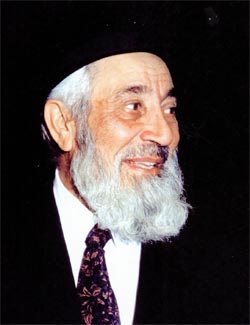
Rabbi Musa Zargari, known as Adon Zargari, was one of those cultural figures among Iranian Jews who relentlessly and passionately dedicated himself to teaching Hebrew and Jewish sciences, preaching the Torah, and raising the kids of the Jewish community in Iran.
He was born in 1923, equivalent to 5684 Hebrew calendar, in a religious family in Kerman, Iran. His father was Rabbi Hezghiya, one of the scholars of Kerman, who, although relatively poor, was determined to raise his children correctly and teach them the religious sciences amid the scarcity of proper educational facilities. Rabbi Hezghiya sent Musa to a traditional school when he was five to learn the basics of the Jewish faith. It should be mentioned that this was a period when schools and education facilities were incredibly scarce across Iran — even non-existent in some regions.
In the 1930s, during Reza Pahlavi’s ministership (later known as Reza Shah), Persian education became mandatory. It was at this time that Musa Zargari began attending primary school at the age of 12. Tragically, it was also when his mother passed away, leaving a deep impact on the teenage Musa, who had to cope with the absence of his mother. The pressure was such that Musa dropped out of school. However, encouraged by his relatives and friends, Musa returned to school a year later. He started working once his primary education was finished, first as a secretary at a small firm and later as an apprentice at his brother’s fabric store.
In 1944, Mr. Zargari was conscripted by the army and served in the army’s hospital. Musa spent his free time during his conscription period teaching Hebrew for free at Genj-e Danesh school in Kerman, which was founded by Otzer Hatorah. He was employed as a teacher and worked there for two years after finishing military service.
The year 1949 marked Musa Zargari’s marriage to Deborah from the Zarbali family, a unity that resulted in six boys, all of whom followed their father in cultural activity. Rav David Zargari is the headmaster of the male and female schools of Tort Haim, Los Angeles. Rav Yosef Zargari teaches and manages the Bani Torah Institute. Three months after their marriage, Musa Zargari migrated to Tehran along with his wife to settle temporarily. But fate would hand them a different deal whereby Musa and his family would remain in Tehran.
In Tehran, Mr. Zargari was soon employed as a Hebrew and religious sciences teacher by Otzer Hatorah, managed by the late Rabbi Isaac Meir Levi. He taught in Jewish schools from 1950 to 1973, including Ganj-e Danesh, Tarasht intersection branch; Ganj-e Danesh, Fakhr Abad branch; Fakhr-e Danesh; Alliance (Etehad) schools; Ort Art School Tehran, and the American joint classes, where he taught young Jews. Also, during a period of ten years, he was responsible for supervising summer camps for young children and teenagers.
Like any other student, Adon Zargari would use any opportunity to elevate his knowledge. He frequently participated in various educational seminars inside Iran and abroad, along with other Hebrew teachers. He loved teaching and believed that teaching is a job that is holy, not one to become wealthy with.
One of his remarkable qualities was his sense of humor. When it comes to his characteristics, he displayed remarkable patience with all students, regardless of their opinions or personalities, nurturing their love for the Torah through his kindness.
In 1973, he became a member of the directors’ board of the cultural assembly of Ganj-e Danesh school. He was also chosen to inspect Jewish schools and educational centers in Tehran.
Adon Zargari is one of the pioneers of translation when it comes to Hebrew and religious texts. Mr. Zargari and Mashallah Rahman co-translated all five books of the Torah into simple Persian, along with the Haftarahs of each Parashah, and Haftarahs of the eids and special days. The translations were published by the Cultural Assembly of Otzer Hatorah in 1985.
Furthermore, he was a part of the team of translators for Hebrew-Persian and Persian-Hebrew dictionaries and collaborated with Professor Solomon Haim in this endeavor for eight years. Among his other valuable services were establishing Hebrew classes for adults and providing religious education and Torah instruction to students who studied in non-Jewish schools and were not familiar with Torah and religious matters. He first held these sessions in Rafinia Synagogue in the evenings. He was later asked by the late Molla Yosef Dilmani to manage Hebrew classes in the Leviyan Synagogue too.
In 1993, Rabbi Zargari migrated to Jerusalem in order to reunite with his family. Once settled, he returned to studying and providing social and cultural service so that fellow Iranian Jews could understand Hebrew books and texts, study them, teach them, and translate them into Persian. It was with his endeavors that Mishkan Moshe Synagogue was established in the Gilo neighborhood of Jerusalem.
Having spent a life of fruitful activities, honorable service, and excellent religious, cultural, and social service, Rabbi Zargari (Adon Moshe Zargari) passed away on the 30th of Tishrei 5768, equivalent to the 12th of October 2007, in Jerusalem.
Other translations by Rabbi Zargari include:
1. Peace of the soul
2. Lifestyle
3. About Hanukah
4. Rabbi Akiva (The Jewish tribe during the era of the Second Temple)
5. Anger, Never
6. Psalms (Tehilim)
7. Book of prayer and invocation (Siddur Tefillah LeMoshe)
8. Bostanai
9. Aguilar
10. Several texts and articles on religious law (Halakha) and facts


 فارسی
فارسی